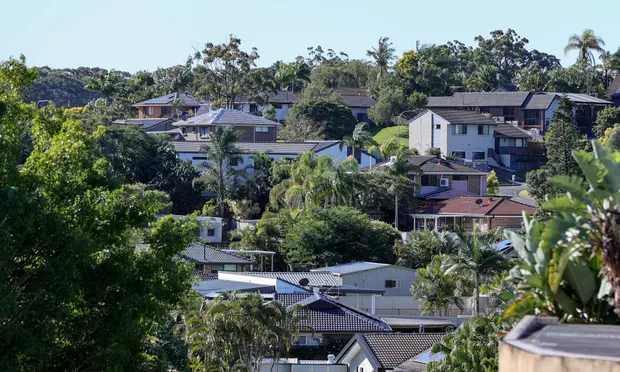IMF sees potential for imminent ‘sizeable’ bust in Australia’s housing market

Australia could soon see a “sizeable” crash in the housing market, according to a new report from the International Monetary Fund which warns that housing affordability is declining rapidly.
Rising interest rates and inflation have so far neutralised the benefit of falling property values, the IMF said in its Housing Market Stability and Affordability in Asia-Pacific report this month, and property prices are as much as 50% above what a median household can afford.Read More : Kohl’s says a real estate sale is on the table after scrapping deal talks The IMF noted that Australia’s housing and rental markets are among the most “misaligned” compared with similar economies, and its citizens among the most overburdened by housing costs.
“Our model-based analysis shows that a high magnitude of price misalignment, when combined with the impacts of high policy rates, can lead to a sizeable price correction, nearly comparable to past episodes of housing busts,” the report said.
“As interest rates increase, affordability is declining rapidly, despite falling housing prices. In 2022, housing prices may be as much as 70% and 50% above what a median household can afford in New Zealand and Australia, respectively, and the average household would need to spend more than 40% of its disposable income to afford housing priced at the median.”
The IMF found Australia has one of the most severe “housing cost overburden” rates, which is the share of the population spending more than 40% of its income on housing. In Australia, about 8% of the population is overburdened: above the OECD average.
“Spending a large share of disposable income on housing-related expenditures is often considered to be a sign of unaffordable housing,” the report notes.
“A significant concern going forward is that higher interest rates will make home ownership unaffordable for the average household due to rising mortgage payments.”
Such misalignment and housing cost overburden rates, plus other factors making housing more unaffordable, are being seen across Asia.
“With rising inflation and interest rates, households face a double shock to their budgets. High mortgage payments, driven by high housing purchase prices and rising interest rates, and high cost of living point to a deterioration of housing affordability, which was already stretched before the pandemic,” the report said.
“Since housing is a key determinant for health and education, and housing inequality can lead to perpetuating socio-economic inequality, restoring housing affordability and … improving access to adequate housing, need to be priorities for policymakers in the region,” the IMF said.
The solution to Australia’s rental crisis is more regulation and fewer landlords. Young people are likely to bear the brunt of the rapidly declining housing affordability, however middle-income households will also be affected.
“As macroeconomic policies influence an intricate balance of demand and supply conditions in housing markets, policymakers need to pay close attention to implications of their decisions on housing affordability.”
The IMF urged governments to break down barriers for home ownership. “Public housing more broadly can play an important role,” the report said.
Rising interest rates and inflation have so far neutralised the benefit of falling property values, the IMF said in its Housing Market Stability and Affordability in Asia-Pacific report this month, and property prices are as much as 50% above what a median household can afford.
“Our model-based analysis shows that a high magnitude of price misalignment, when combined with the impacts of high policy rates, can lead to a sizeable price correction, nearly comparable to past episodes of housing busts,” the report said.
“As interest rates increase, affordability is declining rapidly, despite falling housing prices. In 2022, housing prices may be as much as 70% and 50% above what a median household can afford in New Zealand and Australia, respectively, and the average household would need to spend more than 40% of its disposable income to afford housing priced at the median.”
The IMF found Australia has one of the most severe “housing cost overburden” rates, which is the share of the population spending more than 40% of its income on housing. In Australia, about 8% of the population is overburdened: above the OECD average.
“Spending a large share of disposable income on housing-related expenditures is often considered to be a sign of unaffordable housing,” the report notes.
“A significant concern going forward is that higher interest rates will make home ownership unaffordable for the average household due to rising mortgage payments.”
Such misalignment and housing cost overburden rates, plus other factors making housing more unaffordable, are being seen across Asia.
“With rising inflation and interest rates, households face a double shock to their budgets. High mortgage payments, driven by high housing purchase prices and rising interest rates, and high cost of living point to a deterioration of housing affordability, which was already stretched before the pandemic,” the report said.
“Since housing is a key determinant for health and education, and housing inequality can lead to perpetuating socio-economic inequality, restoring housing affordability and … improving access to adequate housing, need to be priorities for policymakers in the region,” the IMF said.
The solution to Australia’s rental crisis is more regulation and fewer landlords. Young people are likely to bear the brunt of the rapidly declining housing affordability, however middle-income households will also be affected.
“As macroeconomic policies influence an intricate balance of demand and supply conditions in housing markets, policymakers need to pay close attention to implications of their decisions on housing affordability.”
The IMF urged governments to break down barriers for home ownership. “Public housing more broadly can play an important role,” the report said.
Source: www.theguardian.com
Useful Links:
